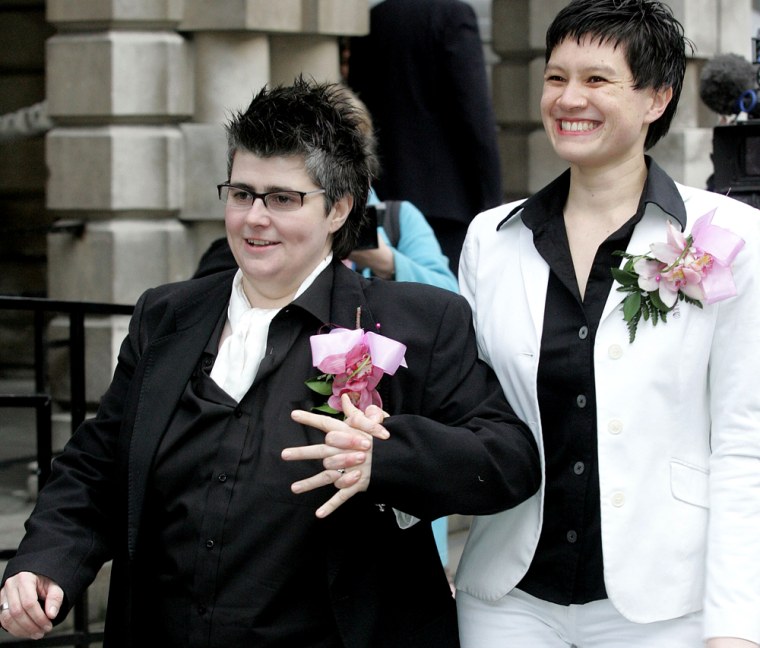The two women strode into City Hall with outsized pink corsages pinned to their black-and-white tailored suits, ignoring the chants of anti-homosexual protesters outside.
The two — Grainne Close, a Northern Ireland social worker, and Shannon Sickels, a New York playwright — emerged from the building after a 30-minute ceremony, smiling and proudly displaying their matching diamond and platinum rings.
Close and Sickels were among the United Kingdom’s first three same-sex unions Monday, when a new British law granting legal status to gay and lesbian couples came into force here first.
As Close and Sickels left, scores of family, friends and gay rights activists tossed flowers and rainbow-colored ribbons in their path.
“This is about making a choice to have our civil rights acknowledged and respected and protected as any human being,” said Sickels, 27, who met her 32-year-old partner in New York four years ago. Their ceremony featured such songs as Dolly Parton’s “Touch Your Woman.”
More than 700 such marriage-style ceremonies will be repeated Tuesday and Wednesday in registry offices across other regions of the United Kingdom — including musician Elton John and his longtime partner — but almost certainly without Belfast’s exceptional brand of conservatism on display.
Protester: ‘You need to repent, love’
Homosexuality itself was outlawed here until 1982, decades after neighboring Britain.
“You need to repent, love,” one of the protesters, the Rev. James Dawson, called out to Brenda Murphy, one of the guests at the first civil partnership ceremony. “This is a travesty, and you’re an abomination before God. God bless you — but first you have to repent of your sins.”
“You would be so lucky to have this lady, love,” Murphy retorted, holding hands with her partner. “I’ll see you at the gates of heaven, mate.”
The measure is already in force in many other European countries. In the United States, more than a dozen states recognize some form of domestic partnerships or civil unions, but 11 states voted in November to ban gay marriage.
Christopher Flanagan and Henry Kane, the second couple to arrive at Belfast City Hall, drove up in a pink stretch limo and kissed amid a deluge of camera flashes. They quipped that, for their reception cake, they’d had to buy two sets of bride and groom figurines and cut off the girls.
The third couple, two women, did not want their names and personal information published.
Anti-gay views in Northern Ireland
The Rev. Ian Brown of the Free Presbyterian Church of Ulster, a protest leader, said most people in Northern Ireland opposed what he called “sodomite propaganda” and homosexuals’ “perverse lifestyle.”
Such views are more widely held in Northern Ireland than in other parts of the United Kingdom. Here, Roman Catholics and Protestants sometimes overcome their political hostility to protest jointly on traditional family issues.
Outside, the crowd of gay rights activists grew to outnumber their evangelical opponents. A gay-rights clown walked about on stilts, while two others donned Hitler-style mustaches and waved satirical placards that read, “Earth is flat” and “Bring back slavery.”
Flanagan, however, emphasized the legal seriousness of the day. Until now, he said, if he was incapacitated or killed, it would have been his gay-averse parents, not his partner, who would make decisions on medical care and receive his inheritance.
“It’s given us legal status behind our relationship, if anything goes wrong,” he said.
Northern Ireland’s police force in May reported a surge in hate crimes against gays over the past two years. As Close and Sickels arrived at Belfast City Hall, an informal poll on Radio Ulster in Belfast registered about 70 percent opposition to civil partnerships.
Some emergency civil unions granted
Although Monday marked the first day for public civil partnership ceremonies, English judges have already granted several gay couples this legal protection, citing emergency circumstances.
One beneficiary was Matthew Roche, 46, who died of lung cancer the day after he and his partner, Christopher Cramp, were legally bound together Dec. 5 in Brighton, southern England.
On Wednesday, the General Register Office in England says 687 same-sex unions will gain legal recognition. The ceremonies come more than a year after the British Parliament approved the law in November 2004. Northern Ireland was first because it has a shorter registration deadline in matrimonial law than do other regions of the United Kingdom.
By far the most intensely watched ceremony will be for John and David Furnish, his partner of 12 years. They plan to confirm their civil partnership at the Guildhall in the royal London suburb of Windsor, the same spot where Prince Charles wed Camilla Parker Bowles in April.
Denmark in 1989 became the first country to legislate for same-sex partnerships. Several other European Union members have followed suit: Belgium, France, Germany, the Netherlands, Norway, Portugal, Spain and Sweden.
